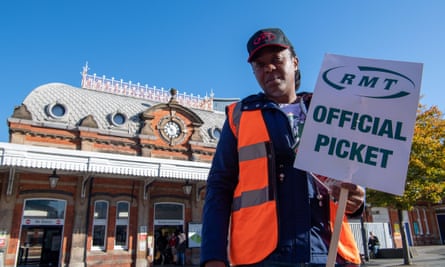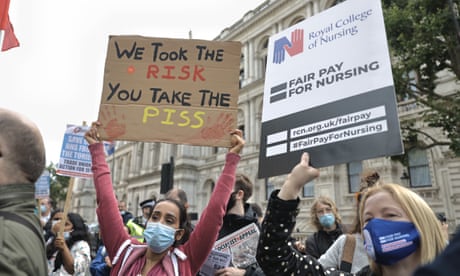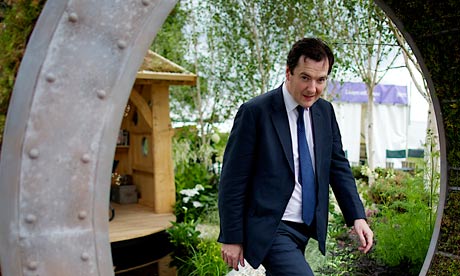Respect for tradition, we are told, underpins the Conservative party. But there’s one tradition for which it has unwavering contempt – strike action: a part of our culture and heritage it has ferociously and instinctively demonised as an antisocial attack on the general public. Tories are known to extol the virtues of rugged individualism, but it seems the collective suddenly matters when industrial action is declared. Then, it seems, society – which in previous Tory eras was doubted to even exist – becomes a totem to be protected from sinister forces, from a malign and externalised striking rabble.
Strikes bring inconvenience. Of course they do. They disrupt our normal life, our plans, our expectations. But the concentrated attempt to stigmatise the very notion of the strike is something that must be resisted. The strike – and the threat of striking – should be celebrated precisely because it underpins many rights and freedoms we now take for granted. Union struggles in the 19th century played a pivotal role in shortening the working day, and in the 20th century, in creating the weekend. In the postwar heyday of union power, they drove up incomes. Strikes are a profound social good.
Yet how little this argument is heard. Anti-union sentiment is profoundly embedded in our political culture. When the Tory chairman, Nadhim Zahawi, suggested on national television that the upcoming nurses’ strike would aid Vladimir Putin by worsening inflation in the west, it was yet another crude illustration of this very British phenomenon, echoing Margaret Thatcher’s denunciation of striking miners as the “enemy within” in the 1980s. This hostility has a long pedigree and, historically at least, the Tories have been known to be candid about their real intentions.

RMT picket at Slough railway station, 8 October 2022. Photograph: Maureen McLean/Rex/Shutterstock
As the 20th century dawned, the Tories defended a legal ruling making unions financially liable for profits lost to strikes, leading the Conservative prime minister Stanley Baldwin to later confess: “The Conservatives can’t talk of class war. They started it.” In 1926, they introduced a raft of anti-union laws in the aftermath of the general strike, including the banning of solidarity industrial action.
But while unions were hobbled in the 1930s, a spirit of collectivism nurtured by wartime sacrifice helped their rebirth. The three-decade social democratic consensus established by Clement Attlee’s Labour government led the Trades Union Congress in 1968 to boast that it had grown from a “small debating assembly” into a body that shared “in the making of government policies, taking part in administering major social services and meeting on equal terms with the spokesmen of the nation’s employers”. This was the era in which Britain enjoyed its highest ever sustained period of economic growth, which – thanks in part to strong unions – was more equitably distributed, boosting the pay of ordinary workers.
When the oil shock of the 1970s sent prices surging, unions mobilised in an effort to match wages with the cost of living. The grand climax – the winter of discontent – was successfully spun by Thatcher to label unions as national bogeyman for a generation. Her successors took up that framing as well. When Tony Blair became prime minister in 1997, he promised that his government would “leave British law the most restrictive on trade unions in the western world”. And David Cameron assailed Ed Miliband as “taking his script from the trade unions”, and turned the screw further, with even more restrictive laws.
But today this anti-union approach jars with political reality. One poll has suggested that nearly six in 10 voters back the nurses’ strike, and another found that more people backed the rail strike than opposed it. After an unprecedented fall in living standards, the default position of millions whose pay packets are shrivelling in real terms has become “well, fair play to them, at least someone is taking a stand”.
While earlier generations of Tories may have used the language of class warfare openly, their modern cohort is savvier. They seek to isolate striking workers from the wider public, portraying them as somehow separate from society at large. Rishi Sunak denounces strikers as a threat to “hardworking families”, as if nurses, paramedics or transport workers are excluded from that category. But this attempt to separate striking workers from society at large collides with the reality people see every day. The withdrawal of strikers’ labour is so noticeable precisely because of how central they are to our way of life. Rather than a middle-finger salute at the general public, it is one part of society crying for help from another.

As the 20th century dawned, the Tories defended a legal ruling making unions financially liable for profits lost to strikes, leading the Conservative prime minister Stanley Baldwin to later confess: “The Conservatives can’t talk of class war. They started it.” In 1926, they introduced a raft of anti-union laws in the aftermath of the general strike, including the banning of solidarity industrial action.
But while unions were hobbled in the 1930s, a spirit of collectivism nurtured by wartime sacrifice helped their rebirth. The three-decade social democratic consensus established by Clement Attlee’s Labour government led the Trades Union Congress in 1968 to boast that it had grown from a “small debating assembly” into a body that shared “in the making of government policies, taking part in administering major social services and meeting on equal terms with the spokesmen of the nation’s employers”. This was the era in which Britain enjoyed its highest ever sustained period of economic growth, which – thanks in part to strong unions – was more equitably distributed, boosting the pay of ordinary workers.
When the oil shock of the 1970s sent prices surging, unions mobilised in an effort to match wages with the cost of living. The grand climax – the winter of discontent – was successfully spun by Thatcher to label unions as national bogeyman for a generation. Her successors took up that framing as well. When Tony Blair became prime minister in 1997, he promised that his government would “leave British law the most restrictive on trade unions in the western world”. And David Cameron assailed Ed Miliband as “taking his script from the trade unions”, and turned the screw further, with even more restrictive laws.
But today this anti-union approach jars with political reality. One poll has suggested that nearly six in 10 voters back the nurses’ strike, and another found that more people backed the rail strike than opposed it. After an unprecedented fall in living standards, the default position of millions whose pay packets are shrivelling in real terms has become “well, fair play to them, at least someone is taking a stand”.
While earlier generations of Tories may have used the language of class warfare openly, their modern cohort is savvier. They seek to isolate striking workers from the wider public, portraying them as somehow separate from society at large. Rishi Sunak denounces strikers as a threat to “hardworking families”, as if nurses, paramedics or transport workers are excluded from that category. But this attempt to separate striking workers from society at large collides with the reality people see every day. The withdrawal of strikers’ labour is so noticeable precisely because of how central they are to our way of life. Rather than a middle-finger salute at the general public, it is one part of society crying for help from another.

Despite all the talk of monstrous disruption, for most the real inconvenience is struggling to pay bills and feed their children, rather than the irritation of a postponed train journey. Real wages are projected to be lower in 2026 than they were in 2008.
Indeed, a fundamental reason for wages being so low and conditions so poor in the UK is because of the dilution of union power. According to one study, the “changes in bargaining power” suffered by unions explains half of the decline in the share of the economy going to wages over four decades in several rich countries, including Britain. Rather than union action inconveniencing everybody else, the decline of unions has dragged down the wages of non-unionised workers, too, according to a US study. A strong labour movement, in other words, brings up everyone’s living standards.
A strike, then, isn’t antisocial behaviour, on a collision course with the interests of the wider public. By neutering the threat of strike action with authoritarian laws, the Tories have succeeded only in weakening a mechanism with a proven record in raising the living standards of all workers. Despite the mythology, no one goes on strike on a whim. A worker forfeiting a day’s pay isn’t just a sacrifice for the sake of their own interests, it’s a gamble and a sacrifice. Indeed, one of the government’s fears is that a victory for nurses or railway workerswould embolden the pay claims of other workers – an anxiety that is well founded.
Union membership should be honoured not just as a democratic right, but as a cornerstone of collective prosperity. Even many union sympathisers have retreated from such an argument, instead blaming bosses and government for any regretful breakdown in industrial relations. But to strike isn’t a sin, or antisocial or an act of mendacity: it’s a key to a society less beset by injustice than our own.








